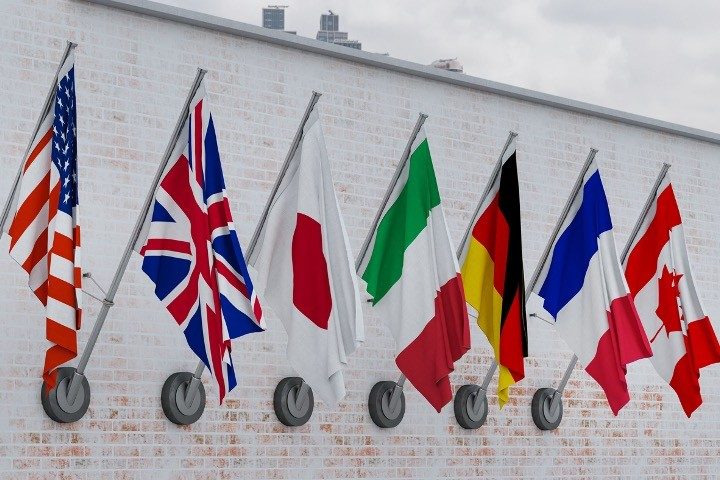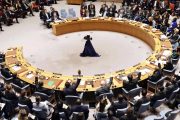
SINGAPORE — Japan, this year’s chair of the Group of Seven (G-7), anticipates the Russia-Ukraine crisis to feature heavily in talks among the world’s major advanced economies, its top finance diplomat declared.
“Sanctions against Russia and support for Ukraine will be a top priority at G-7 financial leaders’ meetings under Japan’s chair,” said Masato Kanda, who will supervise G-7 deputy-level talks on economic policy this year.
Although Kanda underscored the significance of G-7 unity in countering Russia, some analysts opined that there may be differences on sanctions, especially among Europeans who are being coerced to reduce their reliance on Russian energy supplies.
Kanda, who is vice minister of finance for international affairs, outlined the challenges the G-7 will have to face over the coming year. “As the global economy faces various risks, we must respond swiftly and appropriately to recession risks, financial market instability, sanctions against Russia, energy and food concerns and middle-income countries’ debt problems,” he said.
A steep increase in U.S. interest rates has added pressure to the dollar-denominated debt of emerging market economies, already crippled by the Covid-19 lockdowns and economic downturn and now dealing with the high price of food and energy imports due to the war in Ukraine.
Kanda said Japan was cooperating with Sri Lanka to help the latter, which is reeling from its worst economic crisis in 70 years, by liaising with the Paris Club of creditor nations and the International Monetary Fund (IMF) to ensure the involvement of China and India in efforts to restructure Sri Lankan debt.
“It is desirable to work with these non-Paris Club countries in the same way with the Common Framework,” he said, alluding to a Group of 20 (G-20) mechanism set up to provide fast and holistic debt restructuring for nations facing issues meeting debt responsibilities after the Covid-19 brought their economies to their knees. “If this is realized, it would pave the way to carry out debt restructuring for other middle-income countries.”
Additionally, Tokyo hopes to lead talks to boost a regional, multilateral currency-swap arrangement — called the Chiang-Mai Initiative Multilateralization (CMIM) agreement — to prepare for future financial crises and natural disasters, Kanda said.
The CMIM was unveiled in 2000 as a network of bilateral swap accords following the 1997-98 Asian currency crisis, and became a multilateral scheme binding all countries in 2010.
Kanda also reaffirmed Japan’s plans to intervene in the foreign exchange market to curtail excessive volatility in the yen, as it did in 2022, intervening to purchase yen for the first time in 24 years.
“There’s no change to this thinking,” said Kanda, who was at the helm during the intervention to ramp up the yen after it dropped around 30 percent to 32-year lows near 152 to the dollar. The yen has recovered ground since then, and is now trading around 130 per dollar. He added that the government hoped for currency stability. “Sharp, one-sided moves as seen last year are undesirable and cannot be tolerated from the viewpoints of people’s livelihoods and corporate activity,” he said.
While the Finance Ministry oversaw the exchange rate, the Bank of Japan (BOJ) had independence in directing monetary policy and concentrated on attaining price stability. “Generally speaking, the BOJ targets price stability, while we aim for currency stability,” he said.
Some observers have lambasted the BOJ’s ultra-loose monetary policy, claiming that it catalyzed the unpleasant plunge in the yen in 2022 that inflated the cost of raw material imports.
Regarding Ukraine, Japanese Prime Minister Fumio Kishida earlier said he would contemplate visiting the country after an invitation from President Volodymyr Zelensky, as Japan’s ruling party No. 2 publicly encouraged the premier to proceed with the trip.
Kishida told lawmakers that a decision would be made according to the circumstances. Liberal Democratic Party Secretary-General Toshimitsu Motegi told parliament it would be desirable for Kishida to go ahead with the visit. U.S. Defense Secretary Lloyd Austin also said this month Russia was poised to begin an offensive in the spring.
Kishida was invited by Zelensky when they spoke earlier this month. The Japanese premier indicated he plans to bolster coordination to back Ukraine when Japan hosts the G-7 summit in May. Japan and the U.S. are the only two countries among the group whose leaders have not made the visit.
While Japan generally eschews having its leaders visit risky places, such a trip would be one of its ardent public displays of support for Ukraine. Although Tokyo has maintained energy relations with Russia, Japan expressed its backing for Ukraine in the Ukraine-Russia conflict by enforcing sanctions and sending non-lethal military equipment, marking a major policy shift away from its pacifist constitution.
Kishida recently discussed with U.S. President Joe Biden a plan for Japan to become only the second U.S. ally after Britain to be sold Tomahawk cruise missiles, which will permit it to strike ground targets.
During his visit to the White House, Kishida received “crystal clear” reassurance that the U.S. is “fully, thoroughly, completely bound to the alliance — and, more significantly, to Japan’s defense.” Kishida added that he told Western powers that East Asia could be the next Ukraine, as he called for a united front on an emerging China and hostile North Korea.
“The lesson of Ukraine has taught us that the security of Europe and the Indo-Pacific are inseparable,” Kishida told a news conference a day after meeting Biden. “The situation around Japan is becoming increasingly severe with attempts to unilaterally change the status quo by force in the East China Sea and South China Sea and the activation of North Korea’s nuclear and missile activities.”



